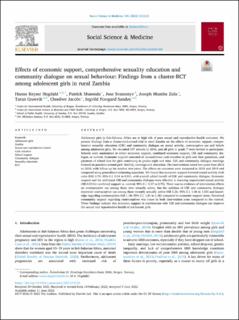| dc.contributor.author | Hegdahl, Hanne Keyser | |
| dc.contributor.author | Musonda, Patrick | |
| dc.contributor.author | Svanemyr, Joar | |
| dc.contributor.author | Zulu, Joseph | |
| dc.contributor.author | Grønvik, Taran | |
| dc.contributor.author | Jacobs, Choolwe | |
| dc.contributor.author | Sandøy, Ingvild Fossgard | |
| dc.date.accessioned | 2022-12-29T11:49:34Z | |
| dc.date.available | 2022-12-29T11:49:34Z | |
| dc.date.created | 2022-08-25T14:22:34Z | |
| dc.date.issued | 2022 | |
| dc.identifier.issn | 0277-9536 | |
| dc.identifier.uri | https://hdl.handle.net/11250/3039844 | |
| dc.description.abstract | Adolescent girls in Sub-Saharan Africa are at high risk of poor sexual and reproductive health outcomes. We present findings from a cluster-randomised trial in rural Zambia on the effects of economic support, comprehensive sexuality education (CSE) and community dialogue on sexual activity, contraceptive use and beliefs among adolescent girls. We recruited 157 schools in 2016, and all girls in grade 7 were invited to participate. Schools were randomised to either economic support, combined economic support, CSE and community dialogue, or control. Economic support consisted of unconditional cash transfers to girls and their guardians, and payment of school fees for girls continuing to grades eight and nine. CSE and community dialogue meetings focused on practices around girls’ fertility, marriage and education. The interventions lasted two years from 2016 to 2018, with follow-up for another two years. The effects on outcomes were measured in 2018 and 2019 and compared using generalised estimating equations. We found that economic support lowered sexual activity (risk ratio (RR) 0.70; 95% C.I. 0.54 to 0.91), with a small added benefit of CSE and community dialogue. Economic support and the additional CSE and community dialogue were effective in lowering unprotected sexual activity (RR 0.53 for combined support vs. control; 95% C.I. 0.37 to 0.75). There was no evidence of intervention effects on contraceptive use among those ever sexually active, but the addition of CSE and community dialogue improved contraceptive use among those recently sexually active (RR 1.26; 95% C.I. 1.06 to 1.50) and knowledge regarding contraceptives (RR 1.18; 95% C.I. 1.01 to 1.38) compared to economic support alone. Perceived community support regarding contraceptives was lower in both intervention arms compared to the control. These findings indicate that economic support in combination with CSE and community dialogue can improve the sexual and reproductive health of adolescent girls. | en_US |
| dc.language.iso | eng | en_US |
| dc.publisher | Elsevier | en_US |
| dc.rights | Navngivelse 4.0 Internasjonal | * |
| dc.rights.uri | http://creativecommons.org/licenses/by/4.0/deed.no | * |
| dc.title | Effects of economic support, comprehensive sexuality education and community dialogue on sexual behaviour: Findings from a cluster-RCT among adolescent girls in rural Zambia | en_US |
| dc.type | Journal article | en_US |
| dc.type | Peer reviewed | en_US |
| dc.description.version | publishedVersion | en_US |
| dc.rights.holder | Copyright 2022 The Author(s) | en_US |
| dc.source.articlenumber | 115125 | en_US |
| cristin.ispublished | true | |
| cristin.fulltext | original | |
| cristin.qualitycode | 2 | |
| dc.identifier.doi | 10.1016/j.socscimed.2022.115125 | |
| dc.identifier.cristin | 2046085 | |
| dc.source.journal | Social Science and Medicine | en_US |
| dc.relation.project | Norges forskningsråd: 223269 | en_US |
| dc.identifier.citation | Social Science and Medicine. 2022, 306, 115125. | en_US |
| dc.source.volume | 306 | en_US |

